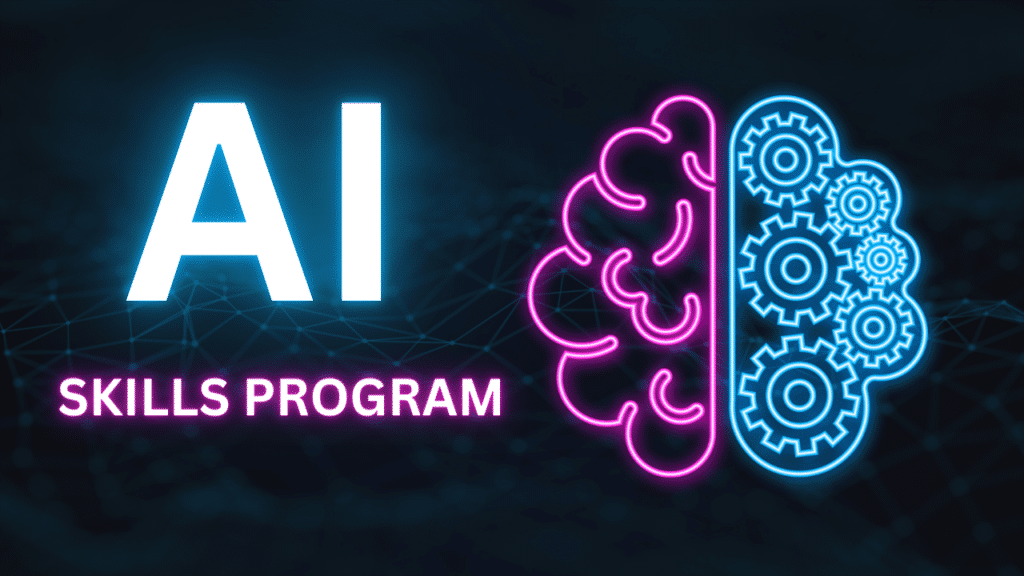Key Takeaways:
- Microsoft's national AI skills program aims to democratize AI education for a future-ready workforce.
- It addresses the skills gap by providing comprehensive training and resources in AI disciplines.
- The program emphasizes ethical AI practices and economic inclusivity.
- Targeting diverse learners, it offers hands-on training, mentorship, and community support.
- Strategic partnerships ensure relevance, accessibility, and inclusivity, fostering a global ecosystem of AI talent.
Question: "What is Microsoft's New National AI Skills Program?"
Answer: Microsoft's new national AI skills program is a pioneering initiative aimed at democratizing access to AI education. It seeks to bridge the gap between the increasing demand for AI proficiency and the current supply of skilled professionals. Through comprehensive training, hands-on workshops, and mentorship opportunities, the program equips learners with both technical acumen and ethical discernment in AI usage. By collaborating with educational institutions, government bodies, and industry partners, Microsoft ensures accessibility and relevance to a wide audience, making AI literacy a cornerstone of professional development in the digital age.
Overview of Microsoft's New National AI Skills Program
In an era where artificial intelligence (AI) is reshaping industries, Microsoft has unveiled a pioneering national AI skills program, aiming to democratize access to AI education across the board. This initiative is a testament to Microsoft's commitment to fostering a future-ready workforce, equipped with the knowledge and tools necessary to thrive in an increasingly AI-driven world. By focusing on the development of critical AI skills, the program seeks to bridge the gap between the burgeoning demand for AI proficiency and the current supply of skilled professionals.
At the heart of this program lies a comprehensive suite of educational resources, workshops, and mentorship opportunities, all designed to cater to a diverse range of learners, from beginners to advanced practitioners. Microsoft's approach is not only about imparting technical knowledge but also about instilling an ethical framework that guides the responsible use of AI. This dual focus ensures that participants not only gain the technical acumen needed to excel in their careers but also the ethical discernment to use AI for the greater good.
Moreover, by collaborating with educational institutions, government bodies, and industry partners, Microsoft is ensuring that its AI skills program is accessible and relevant to a wide audience. This collaborative effort underscores the importance of a collective approach to AI education, one that encourages innovation while addressing societal needs. As the program rolls out nationally, it promises to play a crucial role in shaping the future of the workforce, making AI literacy a cornerstone of professional development in the digital age.
AI-900 Exam Dumps - Microsoft Azure AI Fundamentals
AI-102 Exam Dumps - Designing and Implementing a Microsoft Azure AI Solution
Objectives of the AI Skills Initiative by Microsoft
The AI skills initiative launched by Microsoft is a strategic endeavor aimed at equipping individuals with the necessary competencies to navigate the burgeoning field of artificial intelligence. Central to this initiative is the goal of empowering a diverse demographic with AI literacy, thereby fostering an inclusive digital economy. Microsoft's commitment to this cause is reflected in the multifaceted objectives of the program, which seek to address both the immediate and long-term needs of the workforce.
One of the primary objectives of this initiative is to mitigate the skills gap in the AI sector by providing comprehensive training and resources. This encompasses a broad spectrum of AI disciplines, ensuring that participants can develop a robust skill set that is in high demand across various industries. Furthermore, Microsoft aims to inspire innovation by nurturing a community of learners and professionals who are not only proficient in AI technologies but are also ethical practitioners. This emphasis on ethical considerations is pivotal, as it aligns with the broader societal implications of AI deployment.
Lastly, the initiative aspires to create pathways for economic opportunity and growth. By democratizing access to AI education, Microsoft is laying the groundwork for a future where individuals are better positioned to contribute to and benefit from the AI-driven economy. This strategic focus on skill development, ethical considerations, and economic inclusivity underscores the holistic approach Microsoft is taking to cultivate a future-ready workforce.

The Target Audience for Microsoft's AI Skills Program
The target audience for Microsoft's AI skills program is as diverse as the potential applications of artificial intelligence itself. Aimed at democratizing AI knowledge, the initiative is meticulously designed to cater to a wide spectrum of learners. This includes students embarking on their educational journeys, professionals seeking to pivot or advance their careers, and educators desiring to incorporate AI into their curriculum. Microsoft's inclusive approach ensures that the program is accessible to individuals regardless of their prior expertise in AI, making it a foundational pillar for anyone interested in understanding or applying AI technologies.
Moreover, the program specifically targets underrepresented groups in the technology sector, striving to close the gender and diversity gaps prevalent in STEM fields. By providing tailored resources and support, Microsoft aspires to empower these groups with the skills and confidence needed to excel in AI-related roles. Additionally, entrepreneurs and small business owners stand to benefit significantly from the program, as it offers insights into leveraging AI for business innovation and efficiency. Through this broad outreach, Microsoft's initiative is not just about fostering AI skills but also about building a more inclusive and equitable digital future.
Key Components and Features of the AI Skills Program
The AI skills program spearheaded by Microsoft is distinguished by several key components and features designed to provide a comprehensive learning experience. At the core of the initiative is a robust curriculum that covers fundamental and advanced concepts of artificial intelligence. This educational foundation is supported by practical, hands-on training sessions that enable learners to apply theoretical knowledge to real-world scenarios. Such an approach ensures that participants not only grasp AI principles but also develop the proficiency required to implement AI solutions effectively.
A standout feature of the program is its use of cutting-edge learning platforms and tools. These digital resources facilitate an interactive and engaging learning environment, making complex AI concepts more accessible to a broader audience. Furthermore, Microsoft has integrated mentorship and community-building activities into the program. These elements foster a supportive network where learners can exchange ideas, solve challenges collaboratively, and build professional relationships. This community aspect is crucial for sustaining motivation and encouraging continuous learning and innovation.
In addition, the program places a strong emphasis on ethical AI practices, preparing participants to navigate the moral implications of AI technologies responsibly. By incorporating ethics into the curriculum, Microsoft ensures that graduates of the AI skills program are not just skilled technicians but also conscientious contributors to the field of AI.
Partnerships and Collaborations for Microsoft's AI Initiative
For its AI initiative, Microsoft has embarked on strategic partnerships and collaborations that are pivotal to the program's success and reach. These alliances span across academia, industry, and non-profit sectors, creating a multi-faceted network of support for learners. By teaming up with universities and educational institutions, Microsoft ensures that its AI skills curriculum is not only cutting-edge but also academically rigorous, providing students with credentials that are recognized in the professional world. Such collaborations also facilitate research opportunities and the development of new AI applications, enriching the academic discourse around artificial intelligence.
In the industry sphere, Microsoft has joined forces with technology leaders and business innovators. These partnerships aim to align the AI skills program with market needs, ensuring that the skills taught are directly applicable to current and future job roles. Furthermore, engaging with industry partners allows for internships and job placements for program participants, bridging the gap between education and employment.
Non-profit organizations play a crucial role in extending the reach of Microsoft's AI initiative to underrepresented and disadvantaged communities. Through these collaborations, Microsoft can offer scholarships, grants, and free access to its learning resources, making AI education more inclusive and accessible to all. This comprehensive network of partnerships underscores Microsoft's commitment to fostering a global ecosystem of AI talent.
Impact on Workforce Development and Education
The impact of Microsoft's AI skills initiative on workforce development and education is profound and multifaceted. By prioritizing the cultivation of AI competencies, Microsoft is directly contributing to the creation of a workforce that is not only adept at navigating the complexities of artificial intelligence but is also prepared to lead the charge in innovation across sectors. This initiative is instrumental in closing the skills gap that currently exists in the job market, where the demand for AI expertise far outstrips the supply of qualified professionals. As a result, individuals who participate in this program find themselves at a significant advantage, possessing the skills that are highly sought after in today’s technology-driven economy.
On the educational front, Microsoft's initiative is reshaping how AI is taught and integrated into curricula. By providing educators with resources, training, and support, the program ensures that students are receiving an education that is both current and comprehensive. This not only enhances the quality of education but also prepares students for the realities of a job market that increasingly values AI literacy. Furthermore, by making AI education accessible to a wider audience, including traditionally underrepresented groups, Microsoft is playing a crucial role in democratizing access to technology careers, thus fostering a more diverse and inclusive tech ecosystem.
Success Stories or Case Studies From the AI Skills Program
Among the myriad of success stories emerging from Microsoft's AI skills program, several stand out for their impact and inspiration. One such case involves a group of university students who, through the program, were able to develop an AI-based solution to address food wastage in their community. Leveraging the skills and knowledge gained, they created an application that predicts food surplus in local restaurants and connects them with food banks, demonstrating the real-world applications of AI for social good. This project not only showcased their technical prowess but also their commitment to using AI to solve pressing societal issues.
Another notable success story comes from a mid-career professional who transitioned into the tech industry after completing the AI skills program. Previously working in the hospitality sector, the individual harnessed the power of AI education to pivot their career path entirely, landing a role as an AI specialist in a leading tech firm. This case exemplifies the transformative potential of Microsoft's initiative, opening doors to lucrative and fulfilling careers in technology for people from diverse backgrounds.

These stories underscore the tangible benefits of the AI skills program, highlighting its role not just in fostering technical competence but also in empowering individuals to innovate and make a positive impact on the world through AI. Microsoft's commitment to nurturing talent and driving forward the frontiers of AI application is vividly reflected in these success narratives.
Plans and Expansions of Microsoft's AI Skills Initiative
Looking ahead, Microsoft has ambitious plans to expand its AI skills initiative, aiming to further democratize access to artificial intelligence education and empower individuals around the globe. A key focus will be on scaling the program to reach more learners in underserved and underrepresented communities, thereby fostering greater diversity within the tech industry. This expansion includes increasing the number of scholarships and grants available, and ensuring that financial barriers do not hinder passionate learners from accessing high-quality AI education.
In addition to broadening its geographical reach, Microsoft intends to continuously update the curriculum to reflect the rapid advancements in AI technology. This ensures that the program remains at the cutting edge, providing participants with the most current knowledge and skills. Furthermore, Microsoft plans to deepen its collaborations with industry partners, creating more internship and employment opportunities for graduates of the AI skills program. These efforts are aimed at not just educating, but also integrating learners into the tech ecosystem, thereby driving innovation and growth.
Through these plans and expansions, Microsoft reaffirms its commitment to building a global workforce that is equipped to tackle the challenges and opportunities presented by AI, ultimately contributing to a more inclusive and technologically advanced society.
Comments (0)